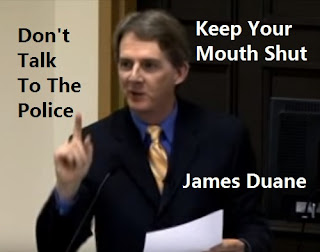The police might contact you in person or by phone and request that you to come to the police station to talk about some vaguely described incident. You are not required to go meet with a police officer or any government agent unless you have received a subpoena from a court. If contacted by the police, insist on a clear explanation of the purpose of the meeting. If the police won't say specifically what they want to ask you about - you are a suspect / subject in their investigation.
If you might be a suspect / subject in an investigation, then tell the police that you choose not to answer questions. Contact an attorney and have the attorney contact the police officer. Do not go to the police station! Do not provide the police with the name of your attorney. Provide your attorney with the name of the police officer that wants to question you. Let your attorney make contact with the police when he or she is ready to do so.
NEVER TALK WITH THE POLICE IF YOU ARE A SUSPECT / SUBJECT IN AN INVESTIGATION WITHOUT AN ATTORNEY PRESENT.
If you are a suspect or person of interest, the police are talking to you to see whether you will admit something to justify detaining or arresting you. You will most likely be making the case against yourself. If they had enough evidence to arrest you, they probably won’t waste time talking to you. Talking to the police may make the difference whether or not you are arrested or if there is enough evidence to convict you. As a practical matter, you will not talk your way out of an arrest. They won’t believe you. Your "denial" will likely be used against you at the trial. Police are experts at pretending to have fingerprints, DNA, witnesses and other evidence that probably does not even exist to trick and trap you. They are investigators trained to use psychological coercive methods to obtain harmful statements. They get innocent people to make confessions and harmful statements. You are just another experiment to see if they can get you to confess or at least make harmful admissions. The police will isolate you and then use minimization or maximization interrogation techniques to coerce a harmful admission from you. Expect either the minimization approach - "it is no big deal, we just need your statement to close the case" or the maximization approach - "you are going to the prison for a long time unless you confess." (Responding to Police Contact - A Citizens' Guide)



No comments:
Post a Comment
Note: Only a member of this blog may post a comment.